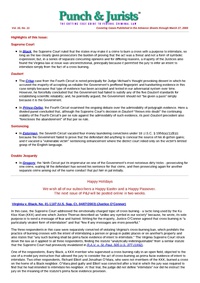The defendant in this case, Gary Esterman, stole money from his Russian business partner by taking funds from a joint business bank account and transferring them, in at least 33 separate transactions to a personal account that Esterman maintained at a different bank. Esterman was convicted of two counts …
Here the Court held that law enforcement officers, investigating charges of criminal fraud by a corporation, violated the Fourth Amendment rights of the employees of that corporation by detaining them incommunicado, without probable cause, and using the threat of continued detention to coerce them into submitting to interrogations.
The …
The defendant was charged with being an unlawful drug user in possession of a firearm, in violation of 18 U.S.C. § 922(g)(3), and carrying a firearm during a drug trafficking crime, in violation of 18 U.S.C. § 924(c), and he pled guilty to both offenses. After defendant was sentenced, …
The defendant in this case. Gary Esterman, stole money from his Russian business partner by taking funds from a joint business bank account and transferring them, in at least 33 separate transactions to a personal account that Esterman maintained at a different bank. Esterman was convicted of two counts …
Plaintiff family members brought a 42 U.S.C. § 1983 action against defendants, a county, and corrections officers, alleging their liability under federal and state law for the decedent's murder while incarcerated. The family members claimed that the correction officers' convictions regarding the decedent's murder collaterally estopped them from disputing …
Here the Court held that a probation department loss calculation made by a competent layman with some "street smarts" about economic issues was not usable for sentencing purposes in this mail fraud case as he relied heavily on double hearsay.
In this prosecution for mail fraud, based on …
In this case, the Supreme Court addressed the emotionally-charged topic of cross burning - a tactic long used by the Ku Klux Klan (KKK) and one which Justice Thomas described as “unlike any symbol in our society” because, he wrote, its sole purpose is to send a message of …
Here the Court reduced the defendant's criminal history category by one level after finding that his past convictions (two of which were more than 20 years old and were for relatively minor crimes) significantly overstated his prior criminal conduct.
The defendant in this case pled guilty to conspiracy …
In this case, a divided panel from the Fourth Circuit debated the continuing validity of that Circuit’s long-standing per se rule banning the admission of polygraph evidence to bolster or undermine credibility. That debate is instructive because it synthesized the evolution of the judicial approach to polygraph evidence from …
Here the Court held that a special condition of supervised release requiring the defendant to “refrain from conduct or activities which would give reasonable cause to believe [that he has] violated any criminal law” proscribes not just criminal activity but a range of behavior so broad as to be …
Here the Court held that the sentencing ranges set forth in Chapter 7 of the Guidelines (dealing with violations of probation and supervised release) are advisory only, and thus not binding on a sentencing judge, and the court is not required to provide notice before departing upward from a …
The defendant in this case was convicted of an armed bank robbery in North Carolina; and he was sentenced to 356 months in prison. He appealed, arguing that his trial was tainted because the Government’s presentation of inadmissible expert testimony on both fingerprint evidence and handwriting evidence. Specifically, he …
In October 1999, the government indicted Miguel Gregory on drug charges. Gregory pled guilty to the charges and was sentenced to 247 days in prison, eight months of home detention and three years of supervised release. Then in March 2001, while Gregory was on home detention after serving his …
The defendant, a 39-year old Mexican citizen who had lawfully resided in the U.S. for 25 years as a permanent residentb alien, pled guilty to conspiracy to distribute cocaine. At sentencing, he requested a downward departure because of his status as a deportable alien, arguing that he would be …
The defendant in this case appealed from a judgment of the District Court which denied his motion to dismiss the indictment against him and applied a four-level enhancement to his base offense level for possessing a firearm in connection with another felony. The defendant was arrested after a neighbor …
Here the Court held that, although 42 U.S.C. § 1997e(e) bars Federal civil actions by a prisoner for mental and emotional injuries suffered while in custody without a showing of some prior physical injury, that statute does not foreclose actions for nominal or punitive damages for violations of the …
